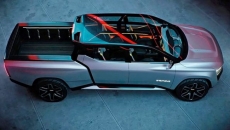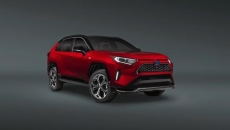If you’re ready to move on from a purely gasoline-fueled vehicle but you’re not ready to go fully electric, you have two choices. You can get a hybrid or a plug-in hybrid vehicle. But which one is best? The experts at Edmunds will help you decide.
Hybrid Pros and Cons
A hybrid electric vehicle has a gasoline engine, a small electric motor, and a small battery pack that work together to improve fuel economy, enhance performance, or both. The best-known hybrid is the Toyota Prius, but they come in all shapes and sizes. From compact cars to full-size pickup trucks, there is a hybrid for just about anyone.
Pros
Improves fuel economy while reducing emissions
Sometimes improves acceleration and overall performance
Often provides electric-only driving at low speeds for short distances
Usually doesn’t reduce passenger or cargo space
Never needs to be plugged in
Small increase in price, if any
Reduced fueling costs
Cons
Cannot travel long distances solely on electricity
Cannot travel at higher speeds only on electricity
Overall, a hybrid electric vehicle is a great choice for anyone who wants better fuel economy, reduced emissions, and lower operating costs without any extra hassle or change in their daily routine. Hybrids are more commonly available than ever, and some automakers are rolling out new models only with hybrid powertrains. For example, every version of the 2025 Toyota Camry is a hybrid, and Honda offers certain versions of the Accord, Civic and CR-V only with hybrid power. Hybrid versions of many other popular models, such as the Kia Sportage and Hyundai Tucson SUVs, are also available.
Plug-in Hybrid Pros and Cons
A plug-in hybrid vehicle, often abbreviated as PHEV, is a hybrid that offers electric-only driving for a short range and can then be plugged in to recharge. They have a gasoline engine like a hybrid does, but thanks to a larger and more powerful electric motor and battery pack, they can travel at a wider range of speeds in electric mode, for many miles at a time. When the battery charge gets low, the gas engine turns on to continue the trip. You can recharge a plug-in hybrid using a household electrical outlet or a home or public charging station.
Pros
Electric-only driving for commuting, taking the kids to school, running errands, etc.
Gas-only driving for longer trips
Can charge the battery overnight using a household-style outlet or in a few hours using a more powerful charging station
The gas engine automatically takes over to power the vehicle when the battery charge is low
Can dramatically improve fuel economy, acceleration, and overall performance while reducing operating costs
Certain models may qualify for a federal tax credit of up to $7,500
May qualify for carpool lane access in certain states with only a driver aboard
Cons
A plug-in typically costs substantially more than a hybrid or gas-only vehicle
Plugging in each night can seem like a hassle
The larger electric motor and battery may reduce passenger or cargo space
The added weight of plug-in hybrid components can negatively affect the ride and handling
If you don’t make a habit of plugging in, it may be less efficient than a hybrid
Plug-in hybrids are perfect for people who want an electric vehicle but worry about driving range, public EV charging infrastructure, and the costs of installing a home charging station. They’re easy to recharge overnight, usually offer enough electric range for typical daily driving, and have a gas engine that eliminates the range anxiety common with driving an EV.
For example, you can drive a plug-in hybrid from Manhattan to Santa Monica and never plug it in. Or when you’re not taking a longer trip, you can plug a plug-in hybrid in every night and hardly burn any gas in everyday driving, especially if you choose a model with a generous electric-only range.
In short, a plug-in hybrid represents the best of both worlds, a perfect bridge from the gasoline past to the electric future. Examples of plug-in hybrids highly rated by Edmunds include the Chrysler Pacifica Hybrid, Hyundai Tucson Plug-in Hybrid, Toyota Prius Prime and Volvo XC60 Recharge.
Edmunds Says
Choosing between a hybrid vehicle and a plug-in hybrid vehicle comes down to three things. First, do you want the ability to drive only on electricity? Second, are you willing to pay more for a vehicle in order to get that? Third, are you willing to put up with some extra hassle to maximize electric-only driving?
If your answers to those questions are “no” and your only goal is to save money at the fuel pump, we recommend a hybrid. But if you want to eliminate as much gasoline use as possible without diving into the deep end of the electric vehicle ownership pool, a plug-in hybrid is perfect.






